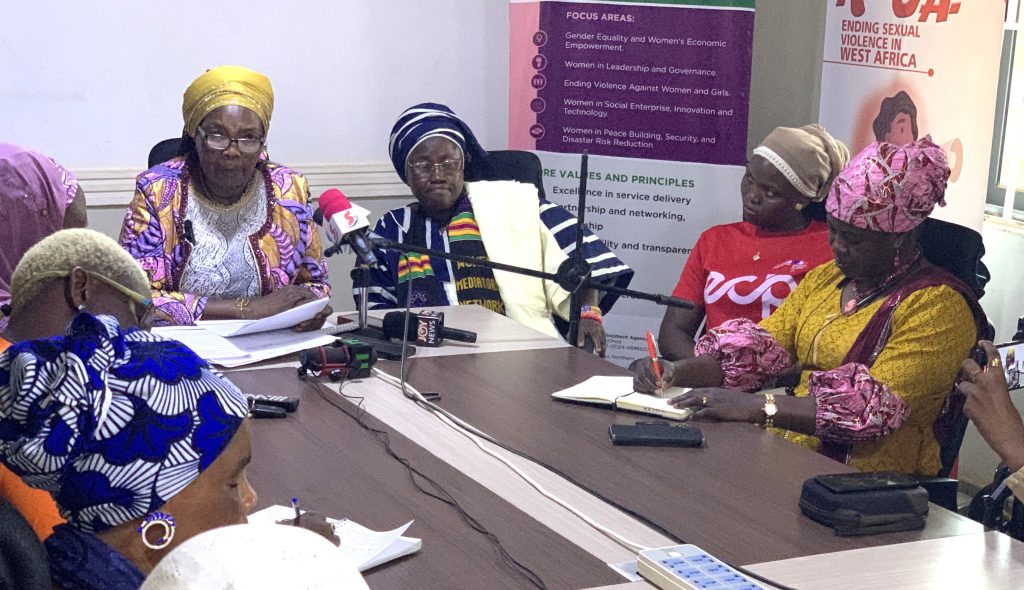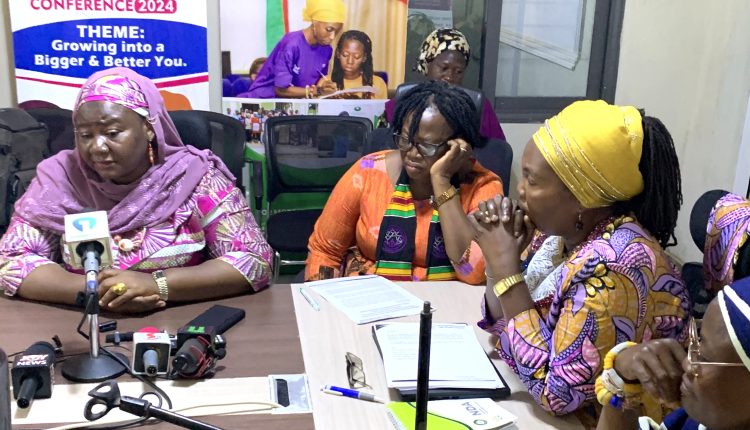The Women Mediators Network of Ghana, (WoMNet), have called on the warring factions in Bawku to immediately ceasefire, stop the hostilities and gun shots and commit to dialogue as the only path to a sustainable resolution of the conflict.
They also called on the two major political parties, the NDC and NPP and other influential and external actors to refrain from exploiting or fueling the conflict for political and economic gain.
WoMNET urged leaders to prioritize the well-being of the people of Bawku and work towards peace and stability. The network pleaded with all stakeholders including the governmental bodies, civil society organizations, traditional and local leaders, and international partners to join hands in addressing these critical areas.
At a joint news conference in Tamale, WoMNET expressed deep concern about the ongoing violent conflict in Bawku and its devastating impact on the community, especially on women and Children.
A statement read by the Executive Director of Savannah Women Development Agency (SWIDA), Hajia Alima Sagito noted that the conflict is unleashing destruction of properties and untold hardship on the people of Bawku, especially women and children.
The network acknowledges the Mediation process commenced by The Ashantihene, Otumfuo Osei Tutu (II), describing it as a step in the right direction. They appealed to stakeholders to remain committed to dialogue as the only peaceful solution to the conflict.
The escalation of violence in Bawku, since last year they observed, has placed women and children at significant risk.
The vulnerable they added are at risk of being displaced, exposed to sexual and gender-based violence, losing their livelihoods, and experiencing limited access to essential services such as healthcare and education for children as already being witnessed.
Children’s schooling WoMNET observed has been significantly disrupted, and women, often primary caregivers, face heightened vulnerabilities as they strive to support their families amidst the violence, curfews and instability.
Executive director of Savannah Women Development Agency Ghana (SWIDA) Hajia Alima Sagito said the markets where women trade and their livelihood have become major battle grounds for the conflict.

’’As we embark on a journey to search for lasting peace for Bawku, WoMNet and partners call for urgent and intentional actions to protect women and children from the devastating impact of the ongoing violence in Bawku’’.
’’As peace mediators and advocates for the implementation of United Nations Security Council Resolution 1325 and its related Ghana National Action Plan, WoMNet emphasizes the critical need to safeguard the lives, rights, and dignity of women and children, who remain disproportionately affected by violence in conflict zones’’, the network stated.
Participation and Protection
WoMNet strongly calls on leaders to ensure the full, equal, and meaningful participation of women in all peace processes related to the Bawku conflict. Women must be included in conflict resolution discussions, decision-making structures, and reconciliation efforts to ensure solutions are inclusive and sustainable.
Their involvement will bring diverse perspectives and foster trust within communities. Scientific research has proven that negotiated peace is 20% more sustainable when women are involved in the Mediation and negotiation processes.
Otumfuo to ensure the process is inclusive with women and youth representation at the negotiation table.
Protection:
Leaders, WoMNET said, must prioritize the protection of women and children from the direct and indirect effects of the violence currently playing out in Bawku. Pillar 2 of Ghana’s National Action Plan of 1325 the women noted makes ample provision for the protection of women and girls in conflict situations.
Preventing and addressing sexual and gender-based violence through clear accountability measures and access to justice, they added.
They call for a special training to be conducted for all personnel deployed to Bawku on the protection of women and children.
’’Sensitizing the community and on laws and policies that protects the rights of women and girls including the Domestic Violence (DV) law and other laws relating to Sexual and Gender Based Violence’’, they observed.
Ensuring the safety of women and children by establishing safe spaces, counseling, and emergency assistance programs and assertiveness training for women and young girls in Bawku.
WoMNET urged the government to ensure availability and access to essential services, such as healthcare and education, which are critical for long-term resilience and recovery.
’’We also call on the two major political parties, the NDC and NPP and other influential and external actors to refrain from exploiting or fueling the conflict for political and economic gain. Leaders must prioritize the well-being of the people of Bawku and work toward peace and stability’’.
The network in partnership with like-minded Women Peace and Security focused civil society organisation including the Ghana Chapter of the UNOWAS Working Group on Women, Youth and Security (UNOWAS), the Ghana Chapter of the Network For the Peace and Security of Women in the ECOWAS Space (NOPSWECO), the Ghana Chapter of the African Women Leaders Network with technical Support of the Foundation for Security and Development in Africa (FOSDA), Peace Legacy and the Savannah Women Integrated Development Agency (SWIDA).
WoMNET is a network of trained Women Conflict Mediators including female members of the National and Regional Peace Councils, peace and security experts, politicians and women’s right activists across Ghana.


